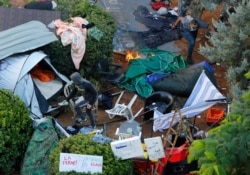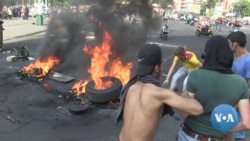Lebanese Prime Minister Saad Hariri announced his resignation Tuesday after 13 days of unprecedented anti-government protests demanding political and economic reform.
In a televised address, the prime minister said he had "reached a dead end" and would submit his resignation to President Michel Aoun.
"I'm going to the presidential palace to submit the resignation of the government," he said. "This is in response to the will and demand of the thousands of Lebanese demanding change."
Hariri urged all political actors to protect Lebanon's stability and improve its troubled economy.
Hundreds of thousands of Lebanese have taken to the streets in mainly peaceful protests across the tiny country, which lies on the shores of the eastern Mediterranean. They are demanding major economic reforms, and an overhaul of a political class considered corrupt and incompetent.
The prime minister's resignation is unlikely to be enough to satisfy them.
"This is their first demand," said Randa Slim, senior fellow at the Washington-based Middle East Institute. "The next demand is going to be the formation of a technocratic cabinet — apolitical and nonpartisan," she told VOA.
The demonstrations have paralyzed the country, forcing the closure of banks, schools and some businesses over the past two weeks.
"We are going into a serious crisis right now," Imad Salamey, political science professor at the Lebanese American University, told VOA by phone from Beirut. "If the president accepts that resignation, that means we are going into a kind of political confrontation rather than some kind of reconciliation."
U.N. Secretary-General Antonio Guterres called on all sides to maintain peace and avoid violence, and for security forces to show restraint and protect civilians and protesters.
"We hope that a political solution would be found to preserve stability and peace in the country," said U.N. Spokesman Farhan Haq.
Hariri's address was cheered by a group of anti-government protesters who returned to their main protest site in central Beirut after being attacked earlier in the day by counter-protesters armed with sticks.
The counter-protesters, believed to be Hezbollah supporters, set many tents on fire and tore down others before they started fighting with demonstrators who were blocking roads in the capital. Security forces were deployed to the protest camp to contain the violence.
Uncertainty ahead
"The stakes for Hezbollah and Aoun are extremely high," Slim said. "This status quo, which until now has been in place, has been very good for them, so upending the status quo means going into a phase of instability, which for Hezbollah is a phase of great danger."
She says they will try to increase the cost on the protesters for continuing their action.
"The question is how will they do it, and how violent can it be?"
The government's resignation could also lead to a power grab by Hezbollah, which has a powerful militia.
WATCH: Political unrest in Lebanon
"Now, Hariri has resigned. And the president, who is an ally of Hezbollah, along with Hezbollah, who command the majority of Parliament, are on their way towards the complete takeover of government," Salamey said. "They just moved Hariri away from their side, and now the country is pretty open for their grab, provided that they can, to a certain extent, manage the economy."
The unrest in Beirut is the worst since 2008, when Hezbollah forces took control of the capital in a brief armed conflict with Hariri loyalists.













